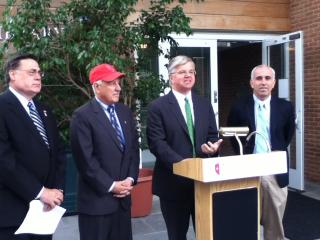Assemblyman Fred W. Thiele, Jr. (I, D, WF-Sag Harbor) and State Senator Ken LaValle today held a meeting at the Stony Brook Southampton Campus to promote a new law they sponsored which provides a tax incentive to builders and homeowners who construct energy efficient green buildings. The law passed in the Assembly 140-0 and in the State Senate 59-0.
The new law authorizes a local government or school district by local law, ordinance, or resolution to provide a real property tax exemption for construction or improvements constructed after January 1, 2013 which meet LEED certification standards for green buildings. The new law covers buildings constructed or improved for businesses as well as homeowners. As part of today’s event, Thiele and LaValle unveiled a model local law or resolution the Towns, Villages, or School Districts could adopt. Today, Suffolk County Legislators Ed Romaine and Jay Schneiderman committed to introducing a similar model local law before the Suffolk County Legislature, and Southampton Town Supervisor Anna Throne-Holst agreed to present this local law to the Southampton Town Board for their consideration.
In addition to LEED certification, the Green Building Initiative’s Green Globes rating system, the American National Standards Institute, or other substantially equivalent standards for certification using a similar program for green buildings as determined by the municipal corporation would also be eligible for the exemption.
The level of exemption would be as follows:
Year Silver Gold Platinum
1 100% 100% 100%
2 100% 100% 100%
3 100% 100% 100%
4 80% 100% 100%
5 60% 80% 100%
6 40% 60% 100%
7 20% 40% 80%
8 0% 20% 60%
9 0% 0% 40%
10 0% 0% 20%
To be eligible for the tax exemption, the construction must exceed $10,000, be certified as a green building, and be the subject of a valid building permit to be eligible for the exemption. Ordinary maintenance and repairs are not eligible for the exemption. The local assessor must approve the exemption. As part of the final agreement on the legislation local governments may establish a maximum exemption amount.
Thiele and LaValle stated, “New York has become pro-active in promoting efforts to reduce energy demands and greenhouse gas emissions by promoting energy efficiency in homes and businesses throughout the State. Significant measures have bean already been enacted in an effort to accomplish this goal such as on-bill financing, solar feed-in tariffs, and net metering. This legislation would provide another major incentive to promote energy efficiency and conservation. Not only will this legislation reduce energy demand, it will promote economic development by encouraging new construction that meets green building standards. This bill will make a real difference in encouraging green construction for both homes and businesses. These incentives will encourage the use of the highest level of energy design in new construction.”


